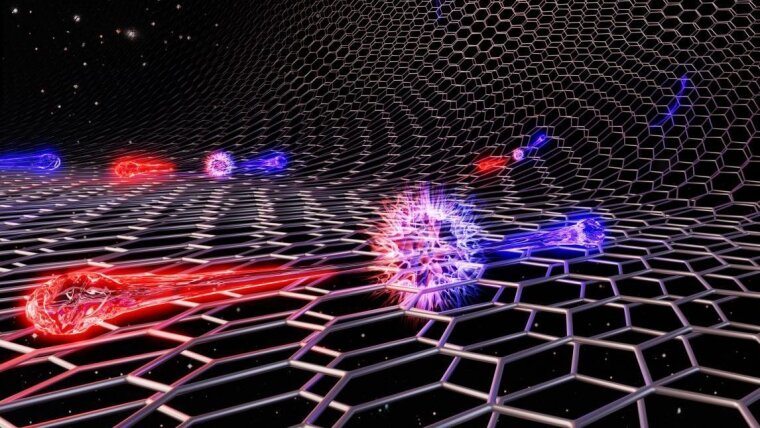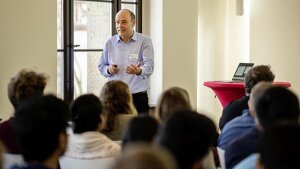
Apply for the M.Sc. Quantum Science & Technology by following the links below:
- 1st step – Registration:External link Register at our University's main portal 'Friedolin' with a valid email and your personal data.
- 2nd step - Online Application:External link After registration, you can apply directly for the M.Sc. Quantum Science & Technology and upload all your application documents. To do so, choose winter semester 2026 at the beginning of the portal process.
How to apply for the M.Sc. Photonics OR the M.Sc. Quantum Science & Technology in 2 steps.
Picture: Friedolin 2.0Application deadlines
- Application deadlines
- January 15 (1st priority deadline for all applicants)
- March 1 (2nd priority deadline for all applicants)
- April 15 (3rd priority deadline for all applicants)
- June 15 (rolling admission deadline for EU applicants)
- August 31 (rolling admission deadline for German applicants and applicants with a valid German residence permit)
- September/October: Start of the pre-sessional courses and the new semester in Jena.
For questions about your application, please write to: master-asp@uni-jena.de
Always include your application number in your email.
Prerequisites
Prof. Ulf Peschel.
Image: Anna SchrollApplicants for the M.Sc. Quantum Science & Technology must have obtained or be about to obtain a bachelor’s degree or equivalent qualifications in physics, natural sciences, or engineering. The final acceptance decision is made by the Abbe School of Photonics evaluation committee.
Note: you do not need to be skilled in the German language. The entire program is taught in English.
Students commencing their studies at our School should ideally have basic or even in-depth knowledge of
- Mathematics (complex numbers and functions, function theory, linear and vector algebra, ordinary and partial differential equations, vector analysis, integral theory)
- Physics (quantum mechanics, solid state physics, atomic and molecular physics)
Application requirements
The following documents are required for the online application:
- Bachelor of Science (B.Sc.), Bachelor of Engineering (B. Eng.) or Bachelor of Technology (B. Tech.) degree comprising significant exposure to physics fundamentals, or an equivalent or higher degree in the same areas. A strong background either in classical physics, electrodynamic theory or quantum mechanics is advantageous. If you have not yet finished your current academic degree, you may apply with a preliminary transcript of records including all completed courses thus far.
- A complete Transcript of Records (ToR) with explicit marks.
- If you have earned or are about to earn a second degree, regardless of whether Bachelor or Master, also send us the respective full Transcripts of Records (ToRs) as available at the date of your application.
- A comprehensive curriculum vitae (CV) of one or two pages in length. Please list all stages of your education chronologically, starting with your high school graduation or equivalent. You should also give a clear statement as to your current status and/or occupation including potential information on (un-)employment or parental leave. Chronological order also means that the CV should not leave any open or unidentified time slots. Any prizes, scholarships or extraordinary social, cultural, or sportive activities may also be listed.
- A letter of motivation (500 typed words maximum). This letter is a unique opportunity to convey personal information about yourself, your life circumstances, and your individual goals.
- Note: Do NOT use an AI text generator to create your personal letter of motivation - our own tools will easily unveil this, and this can be a clear disadvantage of your application.
- A copy of your passport.
- Your high school (secondary school) leaving certificate with marks.
- Proof of your English proficiency by any of the following:
- TOEFL or an equivalent English test (minimum points/grades): TOEFL PBT (550), TOEFL CBT (215), TOEFL IBT (85), IELTS (6.5)
- Cambridge Certificate of Advanced English (CAE) or Certificate of Proficiency in English (CPE)
- A statement from your previous/current university confirming that relevant parts of your higher academic education were taught in English
- German "Abitur"
- Language exemptions: The following students are exempt from providing the proof of English proficiency:
- Nationals from the USA, U.K., Ireland, Australia, New Zealand or Canada, or BSc and MSc graduates who obtained their qualification in one of these countries
- BSc and MSc graduates who have been taught their previous higher academic education completely in English (a language statement from the University is required)
- Holders of a German "Abitur" with sufficient exposure to the English language
- If you are applying for a scholarship of the Abbe School of Photonics, two academic letters of recommendation from two different referees (professors) are required. A template for these letters can be downloaded here;pdf, 274 kb however, the use of this template is not mandatory. Please make sure that each letter of recommendation is signed. If one or both referees prefer personalized, free-style recommendation letters instead, these should contain a quantitative performance statement of yours, a date, and an official headline/stamp from the higher education institution the referee is affiliated with.
Note: If you are applying to study at the Abbe School of Photonics without a scholarship, you do not need to provide letters of recommendation, as they will not affect your application.
Please check the scholarship information and apply for scholarship funding if you are eligible. Please indicate which scholarship(s) you have applied for. If you apply for a scholarship of the Abbe School of Photonics you should apply as early as possible since the decisions on scholarships will be made during the rolling admission process.
For more information, please consult our FAQs. Please note that we cannot accept applications via post or email.

